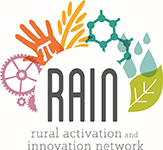Rural Activation and Innovation Network (RAIN) is an Innovations in Development project supporting informal STEM education (ISE) in rural Arizona. Spearheaded by Arizona State University, Arizona Science Center, community leaders in four rural regions across Arizona and the Lifelong Learning Group of COSI, the team will collectively reach 60,000 children and parents and 1,000 STEM professionals by project completion. Each region will develop local ISE projects and experiences, and STEM professional development for community leaders to stimulate dialogue, interest, and engagement of children, families, and organizations in the STEM disciplines, their real-world applications, associated career opportunities, and impact on the local economies. Across the four regions, we will establish a broad and unified state-level presence that advances ISE In the following ways:
- Develop local identity in !SE in rural communities across AZ;
- Create a scope of work in each community that engages community resources and expertise in impactful STEM projects:
- Create a statewide hub through Arizona Science Center to leverage experts, resources, and best practices across communities in the network: and
- Build a research base on how to best engage and empower rural communities in local, place-based ISE.
The hypothesis that underpins the proposed effort is two-fold.
- Locally focused informal STEM learning opportunities can engage rural areas that inspire, maintain, and promote a community identity based in STEM:
- Locally focused ISE programs heighten awareness of, and engagement with, STEM in rural communities by establishing a participatory process sensitive to local values, cultures, and interests.
In a multi-tiered, community-focused model, communities will:
Tier I) Develop local STEM ISE offerings;
Tier II) expand and combine content, organizations, and agencies to develop sustainable regional festivals;
Tier Ill) from the network of community partners, develop ongoing ISE projects and events, built around regional STEM assets; and
Tier IV) provide STEM leadership development for local leaders in each region. A network of rural-area community leaders will be cultivated through working groups and an annual conference. This collective expertise will guide the project team’s development of a best-practices clearinghouse, technical toolkit, and research dissemination products.
Intellectual Merit
This project provides a unique opportunity to study, promote, and engage a broader audience in rural communities, including those in previously underserved areas, and provides much needed data on best practices for reaching this audience. This project represents seminal and foundational work in the area of rural ISE. Researchers from the Lifelong Learning Group of COSI and ASU will explore the following questions: 1) understanding how rural communities currently perceive, access, and engage in informal science learning, and the extent to which they identify themselves and their community in relation to science; and 2) the extent to which relevant, place-based networks can increase public awareness of local STEM assets, resources, and opportunities, and foster a STEM-related identity at the personal and community level.
Broader Impacts
This project will capitalize on existing ISE and STEM organizations, practitioners, academics, and others to collaborate and explore innovative ways of support for STEM education among underrepresented populations. It will develop a suite of tools and best practices for promoting collaboration of ISE and STEM-based professionals and organizations and transfer of STEM learning that is replicable in other rural and remote settings nationwide. These products will be circulated to rural communities and other ISE organizers both nationally and internationally to facilitate large-scale, statewide STEM education and workforce development. Dissemination will include academic and professional conferences and publications, and made available to local and state governments.
